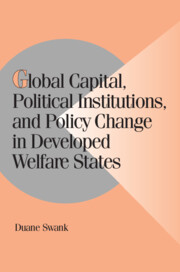Book contents
- Frontmatter
- Contents
- List of Figures and Tables
- Preface
- 1 INTRODUCTION
- 2 GLOBALIZATION, DEMOCRACY, AND THE WELFARE STATE
- 3 GLOBAL CAPITAL, POLITICAL INSTITUTIONS, AND CONTEMPORARY WELFARE STATE DEVELOPMENT: QUANTITATIVE ANALYSIS
- 4 BIG WELFARE STATES IN GLOBAL MARKETS: INTERNATIONALIZATION AND WELFARE STATE REFORM IN THE NORDIC SOCIAL DEMOCRACIES
- 5 GLOBALIZATION AND POLICY CHANGE IN CORPORATIST CONSERVATIVE WELFARE STATES
- 6 INTERNATIONALIZATION AND LIBERAL WELFARE STATES: A SYNOPSIS
- 7 ASSESSING LONG-TERM IMPACTS: THE EFFECT OF GLOBALIZATION ON TAXATION, INSTITUTIONS, AND CONTROL OF THE MACROECONOMY
- 8 CONCLUSIONS: NATIONAL WELFARE STATES IN A GLOBAL ECONOMY
- APPENDIX A Data Sources
- APPENDIX B Alternative Estimators
- References
- Index
- Titles in the series
3 - GLOBAL CAPITAL, POLITICAL INSTITUTIONS, AND CONTEMPORARY WELFARE STATE DEVELOPMENT: QUANTITATIVE ANALYSIS
Published online by Cambridge University Press: 13 January 2010
- Frontmatter
- Contents
- List of Figures and Tables
- Preface
- 1 INTRODUCTION
- 2 GLOBALIZATION, DEMOCRACY, AND THE WELFARE STATE
- 3 GLOBAL CAPITAL, POLITICAL INSTITUTIONS, AND CONTEMPORARY WELFARE STATE DEVELOPMENT: QUANTITATIVE ANALYSIS
- 4 BIG WELFARE STATES IN GLOBAL MARKETS: INTERNATIONALIZATION AND WELFARE STATE REFORM IN THE NORDIC SOCIAL DEMOCRACIES
- 5 GLOBALIZATION AND POLICY CHANGE IN CORPORATIST CONSERVATIVE WELFARE STATES
- 6 INTERNATIONALIZATION AND LIBERAL WELFARE STATES: A SYNOPSIS
- 7 ASSESSING LONG-TERM IMPACTS: THE EFFECT OF GLOBALIZATION ON TAXATION, INSTITUTIONS, AND CONTROL OF THE MACROECONOMY
- 8 CONCLUSIONS: NATIONAL WELFARE STATES IN A GLOBAL ECONOMY
- APPENDIX A Data Sources
- APPENDIX B Alternative Estimators
- References
- Index
- Titles in the series
Summary
In this chapter, I present a quantitative analysis of the central questions of this study. I initially provide a brief overview of the structure and recent development of the contemporary welfare state in advanced capitalist democracies. This exercise, significantly augmented in the country studies of subsequent chapters, brings into concrete relief the changing fortunes of the welfare state across the latter years of welfare expansion and the contemporary era of retrenchment initiatives and restructuring. Subsequently, I discuss my methodological approach to the quantitative analysis of internationalization and social policy change, addressing measurement issues, econometric model development, and statistical estimation techniques. In the main body of the chapter, I present assessments of the direct welfare state effects of international capital mobility, the impacts of internationalization on the dynamics of welfare state convergence and divergence, and the contingent and conjunctural policy effects of capital mobility (following the supplementary hypotheses outlined in the preceding chapter).
I also provide a series of analyses of the ways in which national institutions shape the domestic policy consequences of internationalization. I evaluate my arguments about the foundational role of democratic institutions by examining how capital mobility affects total social welfare effort in different institutional contexts across the entire sample of years and countries (i.e., 1965–93 in 15 developed democracies). To deepen the analysis, I then analyze the direct welfare state impacts of international capital mobility on three key dimensions of social welfare protection – income maintenance, the social wage, and government provision of health care – for the entire sample and within three clusters of welfare states defined by programmatic attributes (and, indirectly, by political institutional contexts).
- Type
- Chapter
- Information
- Global Capital, Political Institutions, and Policy Change in Developed Welfare States , pp. 67 - 121Publisher: Cambridge University PressPrint publication year: 2002



